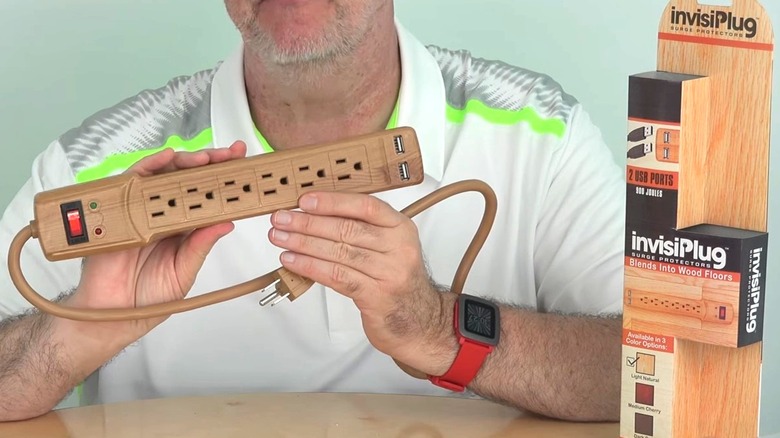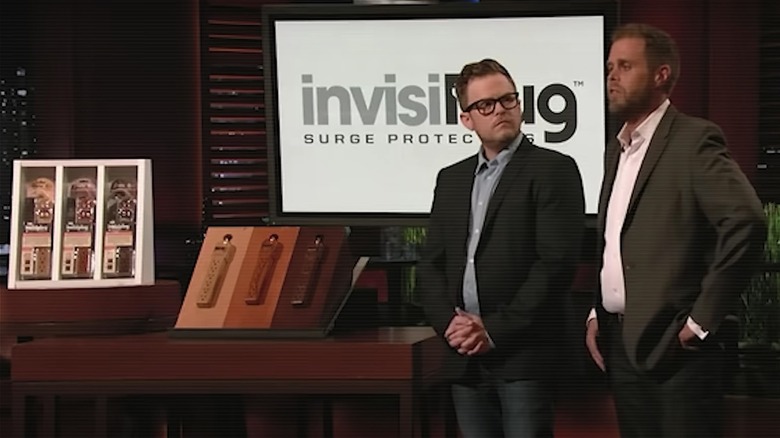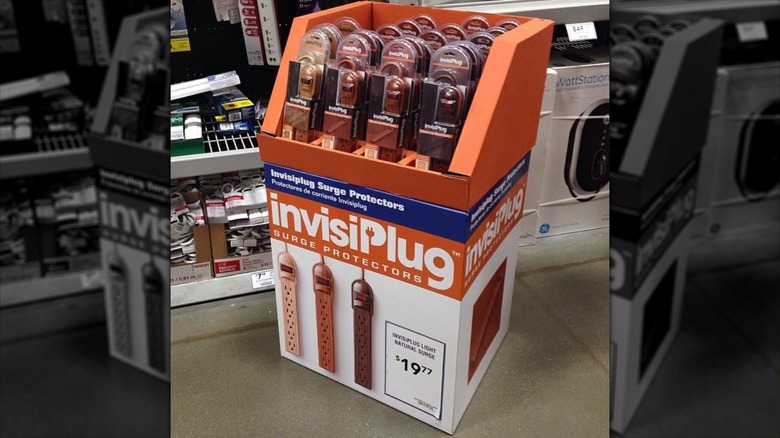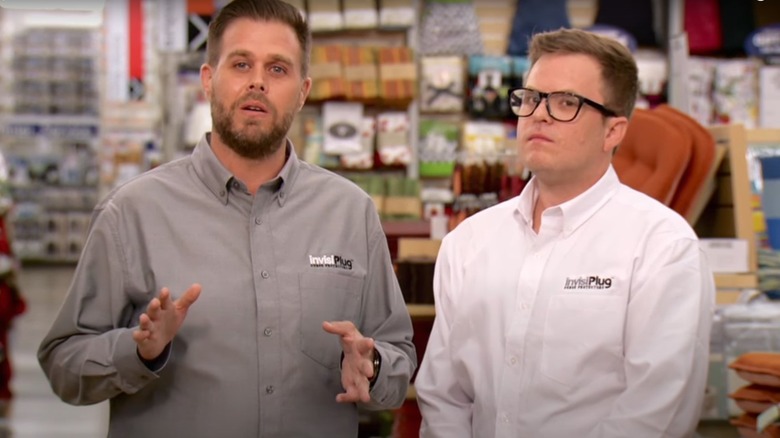Whatever Happened To Invisiplug — Wood Print Electrical Outlet Strip After Shark Tank Season 5?
It's tricky enough trying to hide your TV wires, but what can you do to disguise a clunky, ugly power strip? Surge protector power strips are a modern-day essential, but since they were first invented in the early 20th century, they haven't advanced much in terms of aesthetics. When you go to purchase a new power strip, you'll probably find that it only comes in two colors, black or white. Neither of these options look great on a natural wood, vinyl, or laminate flooring.
That's why Michael Barzman and Bryan O'Connell founded Invisiplug. This handy surge-protected power strip is designed to blend in with hardwood floors — or any wood-like surface, for that matter. The product came in three colorways: light natural, medium cherry, and dark oak. That way, buyers could easily find a power strip that blended in with nearly any wood hue instead of sticking out like a sore thumb. Hoping an investor could help them market the product, Barzman and O'Connell brought Invisiplug onto "Shark Tank," but did their idea spark any interest from the sharks? Here's what happened on "Shark Tank" Season 5, Episode 14 and what happened to Invisiplug after the show.
What happened to Invisiplug on Shark Tank?
Bryan O'Connell and Michael Barzman waltzed into the shark tank seeking $125,000 in exchange for 10% of the company. They unveiled the Invisiplug, but immediately the sharks smelled a problem. Invisiplug had a patent on their wood-look design process, but more established manufacturers could easily mimic it. "What is to stop them from simply dyeing theirs and crushing you like the extension cord cockroaches you are?" Kevin O'Leary said.
Mark Cuban was the first shark out. Robert Herjavec couldn't see the market either, explaining that most people would rather just hide an ugly surge protector. "So we have to pay you $1.25 million valuation ... What are you guys, nuts?", O'Leary continued with his brutal reaction. Barbara Corcoran said she personally wanted to buy three dozen plugs from O'Connell and Barzman. However, she agreed with O'Leary that the valuation was way too high.
After hearing that Invisiplug would soon be featured in Oprah Magazine, Lori Greiner decided to make an offer: a $125,000 loan for 10% equity with $1 per unit until her loan was paid back, plus $0.50 on every product sold after recouping her investment — forever. O'Connell and Barzman were able to talk her down to $0.25 in perpetuity. Suddenly, Herjavec jumped back in, offering to give them $125,000 for 25% with no royalty, which the founders talked down to $20. They decided to turn down Hajervac's offer and instead took the deal with Greiner.
Invisiplug after Shark Tank
After their debut on "Shark Tank," Invisiplug quickly hit the road attending product shows and promotional events. Their proposed deal with Lori Greiner was locked in, and Invisiplug went on to become recognized as one of Greiner's "All-Star" companies. The product was quickly grabbed up by retailers like Lowes, Staples, Target, and Amazon. Invisiplug was even featured in her special "Shark Tank" section at Bed Bath & Beyond. After just nine months under Lori's guidance, the company grossed $800,000.
"The 'Shark Tank' experience was completely surreal. We went from a budding company to a full-fledged business. Between the exposure we had and Lori Greiner's support, we are now either selling to or in front of every one of the major retailers we dreamed of doing business with," Bryan O'Connell said in an interview with Staples. The co-founders were both very pleased with Greiner's financial and promotional assistance and eventually reached a value of around $1.25 million (take that, Kevin!). Unfortunately, all of that wild success was short-lived.
Why did Invisiplug go out of business?
Despite their fast track to success, Invisiplug officially went out of business in 2017. It's hard to say for certain why the company went out of business, but there are a couple likely reasons. The Invisiplug episode of "Shark Tank" aired in 2014, at a time when aesthetically-pleasing surge protectors weren't a widespread idea. Today, it's much easier to shop online for similar surge protectors in a wide range of colors, prints, and styles.
The other reason Invisiplug may have failed was because of one founder's damaged reputation. Shortly after Invisiplug had started to gain traction, Michael Barzman was faced with a handful of lawsuits that were unrelated to the company. Allegedly, Barzman had argued with someone smoking a cigarette near his apartment building when he pointed a gun at the man and threatened to harm him. The man called the police and Barzman was arrested and charged with one count of assault with a firearm and one count of making criminal threats. Barzman pled not guilty in court and was released on $50,000 bail in November 2016, just over a year before Invisiplug would shut down its operations.
What's next for Invisiplug's founders?
What happened to the founders Bryan O'Connell and Michael Barzman after Invisiplug was dissolved? It seems that Barzman has continued down a rocky path in recent years; he was arrested again in January 2020 on charges of assault with a firearm. Although he pled guilty in court, the charges against him were eventually dropped. However, in April 2023 he found himself in trouble again. Barzman, who had struggled to pay for years of bone cancer treatment, had allegedly sold forged artwork to the Orlando Museum of Art and lied to the FBI about the artwork's origins. Barzman pled guilty and was sentenced to three years of probation, 500 hours of community service, and a $500 fine.
O'Connell seems to be keeping a low profile these days, possibly not wanting to be associated with Barzman's slew of legal troubles. We weren't able to find an update on O'connell's life or business ventures, but it's possible that he took his inventive mindset in a new direction after Invisiplug.



